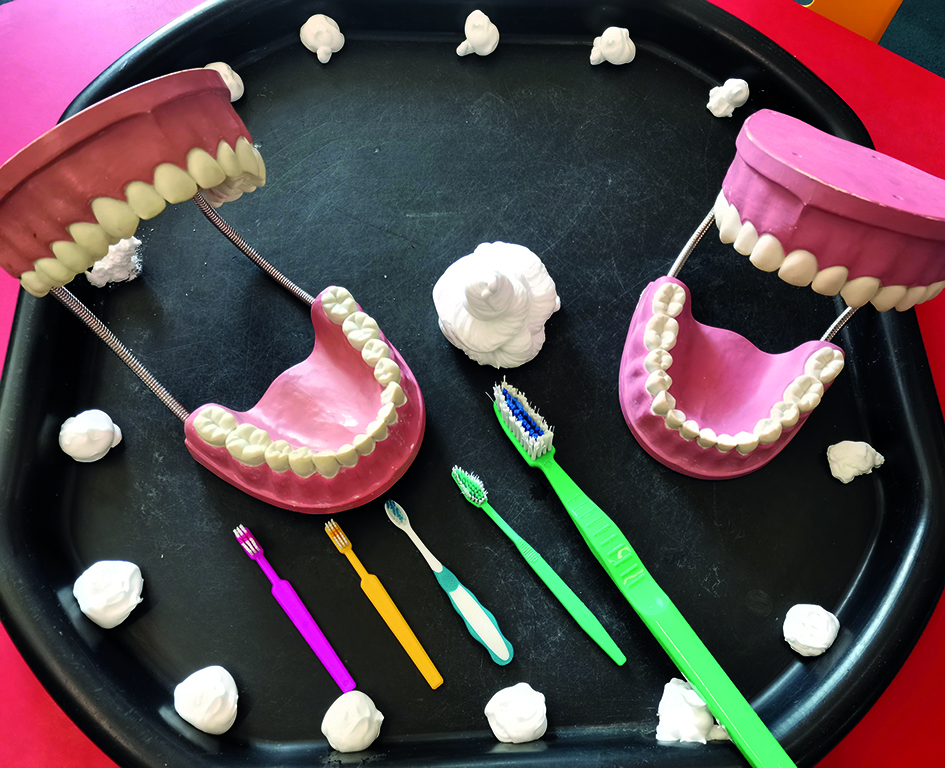
Promoting the good oral health of children is a safeguarding and welfare requirement of the revised EYFS statutory framework.
Government surveys have shown that a concerning number of children have tooth decay by the time they are five, and Great Yarmouth – where our nursery is situated – is an area that has above national average levels. For these reasons, we decided to think of ways to interweave promoting good oral health into our practice in valuable and meaningful ways.
As well as adult-led activities and discussions to help to emphasise the importance of good oral health, visiting the dentist and effective toothbrushing routines, we also added some enhancements to our environment to reinforce the messages that we are teaching the children. These oral health enhancements enable children to apply what they have learnt into their independent play, which helps to embed their learning more deeply.
Adults observing the children’s play and interactions can assess the children who are demonstrating what they know through their play. They may decide whether any information needs repeating or to be taught in a different way, or the children’s play could help the staff to know what direction to take future learning if they are showing an interest in certain aspects of what they have been taught.
HEALTHY SMILES
 Our nursery has a Healthy Smiles Accreditation and we have links with an oral health improvement practitioner from Community Dental Services, who visits our school to hold free workshops. She also has supported us in setting up our Supervised Toothbrushing Programme. These sessions encourage children to think carefully about the importance of brushing their own teeth and how to do it thoroughly. They enable children to develop independence with their toothbrushing, which is especially important in households where children may get less support with their oral health than others.
Our nursery has a Healthy Smiles Accreditation and we have links with an oral health improvement practitioner from Community Dental Services, who visits our school to hold free workshops. She also has supported us in setting up our Supervised Toothbrushing Programme. These sessions encourage children to think carefully about the importance of brushing their own teeth and how to do it thoroughly. They enable children to develop independence with their toothbrushing, which is especially important in households where children may get less support with their oral health than others.
In the nursery we promote healthy food and drink choices daily through our snack times, where fruit, veg, milk and water are provided. Healthy food choices are discussed and encouraged, and fun activities take place, such as making repeating pattern fruit kebabs.
FRUIT AND VEG
Within the home corner continuous provision there is a wooden fruit and vegetable set, but we also sometimes enhance the kitchen with real fruit and veg in a bowl so that the children can play with authentic food. Exploring the real fruit and vegetables using their senses and pretending to eat the fruit and vegetables in the home corner can encourage children to give them a try at home or at snack time.
Also, when we have set up a shop for role play, we will use real food items such as potatoes, carrots and apples, and we put water into empty milk containers.
BABY DOLLS
Baby dolls are also part of our home corner continuous provision. The children enjoy taking care of the babies. We added toothbrushes to the doll equipment so that children can act out toothbrushing as part of the baby’s routine.
Sometimes we set up a baby bath in the water tray, which deeply engages the children in caring for the baby dolls. We put in bubbly water, wash cloths, sponges and empty bottles of shampoo. To continue the messages of toothbrushing being part of a healthy routine, we put toothbrushes and empty toothpaste tubes on the side of the bath. This encourages lots of discussion about making sure the babies have clean teeth before they go to bed or in the morning when they wake up.
SPARKLING CLEAN!
Another way to promote effective toothbrushing that we use in the environment is our giant-sized models of teeth in a tuff tray, different sized toothbrushes, and blobs of shaving foam to represent toothpaste.
The children are very keen to brush the giant teeth, dipping the brushes in the foam and rubbing them all over the teeth. They make comments such as, ‘I’ve got to do all the back ones’, demonstrating that they remember what the adults have told them. Sometimes we add small pieces of tissue paper to the teeth to represent plaque. The children straight away set to work when they see the teeth, determined to make them sparkling clean.
Amy Jackson is EYFS specialist leader of education and teacher at Ormiston Herman Academy, Gorleston









